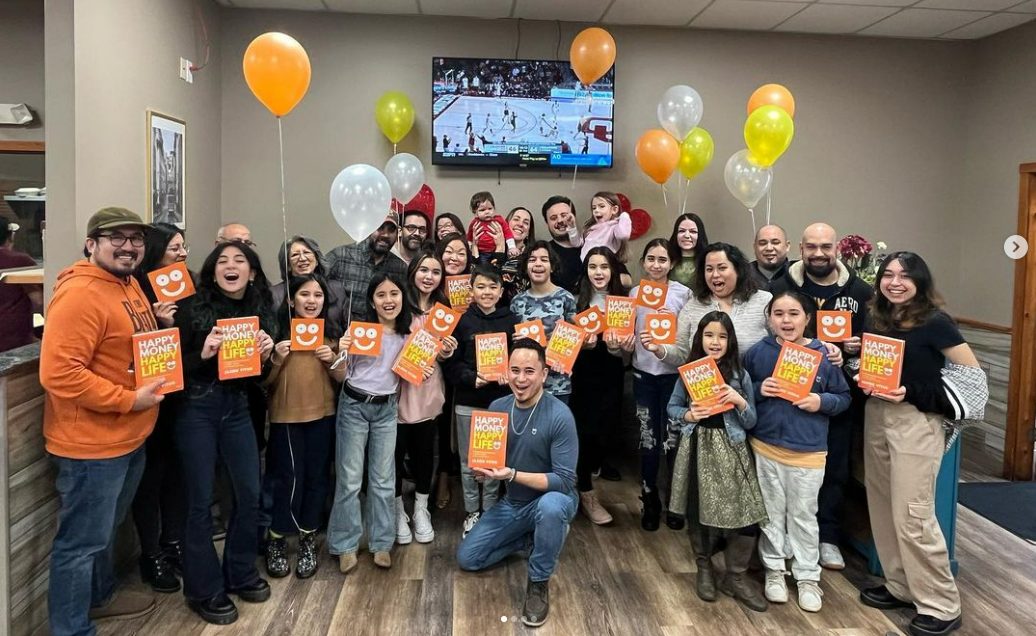In society, we are often made to believe there is a single correct path to success and happiness. A traditional lifecycle we need to follow in order to live a good life: graduate high school, go to a good college and get your degree, land a job, buy a car, get married, buy a house, have kids, retire, and so on.

Jason Vitug
This lifecycle is ingrained in us from the time we are kids. In the credit union industry, we call them “life stages,” and much of our marketing and sales tactics rely upon them—despite their accuracy and effectiveness being called into question.
Jason Vitug had followed this path religiously, successfully navigating his way through each life stage and onto the next. In fact, he had done so well on this path, that after only a few years working at a credit union, he was made VP of Marketing and Business Development and soon after was named the CEO’s successor, all before the age of 30.
From the outside, Vitug’s life was a roaring success. Internally, however, he struggled with feeling overwhelmed and dissatisfied. He was lacking the happiness that was promised by the life path he was told to follow.
“Every single time I reached a new milestone,” Vitug remarked, “I thought, ‘Okay, so when am I supposed to feel happy? Is this it?’”
Founding Phroogal
Realizing his success had not brought him the joy he had hoped for, and needing time to reassess, Vitug did “the most irrational thing possible” and resigned as CEO. He then spent the next year of his life traveling, reflecting on his life journey, and struggling to figure out how he reached such burnout doing work he loved.
During his travels, Vitug realized that his time working for credit unions and having access to their products and services had allowed him to become financially empowered. However, there were many that lacked the same opportunity to do so or simply were unaware of how to begin their journey to financial literacy. He returned from his travels with the motivation to change that, founding his financial literacy website, Phroogal.
 “I got back with a purpose to empower others to achieve financial wellness so they could get off the ‘traditional path’ and find their own way,” said Vitug. “That’s how Phroogal started: as a blog to get people to understand my story, to understand the power of shifting our mindset when it comes to money, and to access resources, tools to write products and services, and a network of people striving for something more.”
“I got back with a purpose to empower others to achieve financial wellness so they could get off the ‘traditional path’ and find their own way,” said Vitug. “That’s how Phroogal started: as a blog to get people to understand my story, to understand the power of shifting our mindset when it comes to money, and to access resources, tools to write products and services, and a network of people striving for something more.”
Taking it on the road
From there, Phroogal grew, as did Vitug’s commitment to making financial literacy tools accessible to the masses. In the wake of Phroogal’s success, Vitug created his Route to Financial Wellness program in 2015 and went on tour with the program that same year. Within one month, Vitug and his team hosted 37 financial education events across the country with a total of over 8,000 attendees.
Collaborating with credit unions, FinTechs, universities, and community organizations, the Route to Financial Wellness events were hosted in bars, bowling alleys, and restaurants as a means to appeal to a wider audience as well as encourage open conversation in a casual environment in an effort to break the taboo on discussing money.
“I wanted to be that person to say, ‘Hey, we’re already discussing this, so let’s be more upfront because financial health is vital to our well-being.’”
Following the wellness tour, Vitug published his first book, You Only Live Once, which discussed what he had covered on tour and aimed at teaching people how to balance saving for the future and making smart money choices with still being able to enjoy today.
“It’s about understanding that time is the most valuable resource that we have,” Vitug explained. “It’s about living well today while planning for a better financial tomorrow. I don’t ever advise people to sacrifice for some time in the future. There is a way for us to enjoy this present moment, while also saving, investing, etc. These are things that I’ve done without this act of deprivation.”
The success of his first book eventually led to Happy Money, Happy Life, his second of three books on financial wellness. It focuses on what Vitug calls the eight wellness dimensions—mental, emotional, physical, spiritual, environmental, occupational, social, and financial—and how money influences each of these for better or worse.
“I wanted people to understand that whether they’re excelling professionally or they’re reaching their financial goals and wondering, ‘Why am I not happy?’ that there are these other aspects of themselves that they may not be devoting the necessary time or resources to. And of course, I tie that back into the financial conversation.”
The CU Happy Tour 2023
In 2023, Vitug and his team are once again hitting the road for their CU Happy Tour. This time, they plan to hit all 50 states and are looking for 100 credit unions to collaborate with along the way—two in each state—with the ultimate goal of turning local financial discussions into a national conversation.
The tour will tackle two specific approaches when working with these credit unions. The first will focus on bringing education to credit union staff members through all staff financial education workshops. This aspect is critical to the overall financial wellness mission, as Vitug believes employees should be a central part of the financial literacy conversation. Not only are they members of the credit union who may struggle with their own financial wellness, but they are also the frontline workers who deal with members day in and day out.
“If credit unions want their staff, especially those who are member-facing, to have very thoughtful, empathetic conversations with their members, they need to first have these financial wellness conversations with the staff members,” Vitug remarked. “That has been something I’m loving while working with credit unions, they realize they need to devote resources and time to the financial well-being of their staff because it will translate to better member service when it comes to the membership at large.”
The second approach will focus on community workshops sponsored by credit unions. Similarly to the Route to Financial Wellness tour, Vitug and his team will be hosting events at local establishments in order to educate people in the community on financial topics and discuss the eight wellness dimensions Vitug covers in his book.
Connecting with the credit union industry
While it is important to support financial wellness in the community, it is only one half of the puzzle. The other half is getting attendees connected with local financial institutions (i.e. credit unions) that can support them in reaching their financial goals. It is no secret that there is a lack of education about credit unions, and these workshops are great opportunities to showcase what the industry stands for and why credit unions are the perfect financial partner.
“We can’t just simply focus on the features of a credit union, the benefits of the credit union,” cautions Vitug. “We need to focus on the heart of the credit union movement, and we can do so by talking about people’s hopes and dreams, their thoughts and feelings as it relates to money. That is the specialty of credit unions—they can have more thoughtful conversations with the community that engages them, excites them, and ignites their own curiosity. This is where credit unions can shine.”
When asked about his commitment to working with credit unions on his financial wellness tour, Vitug expressed that despite leaving the industry, he was still a fierce advocate of credit unions and worked to support them, even if he wasn’t working directly in a credit union.
“I’ve been an advocate since I joined as an employee. Now, as an entrepreneur, author, and owner of Phroogal, I’m a big proponent of the movement, because I believe in the financial cooperative principles and I believe in the people who are very passionate about a movement that can help elevate individuals.”
How your credit union can get involved
As we wrap up another successful Financial Literacy Month, it is important for credit unions to remember their work is only just beginning. As cooperatives, our commitment to education is written in our foundation, and it is important to continue to find ways to bring financial literacy into all we do.
For credit unions looking to join in on the CU Happy Tour, whether for your staff, for your members, for your community, or all of the above, you can learn more and connect with Jason Vitug on the CU Happy website or on LinkedIn.

























































Chris Petro#1
I always knew Jason had the passion for helping members reach their financial goals!